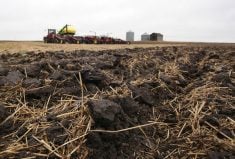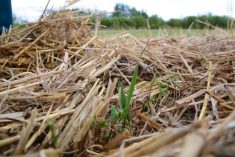The industry argues Ottawa should have instead used the money to fund programs to promote greenhouse gas reduction
The executive director of advocacy group Solar Alberta is crying foul over the federal government’s move to refund the province’s consumer carbon taxes in the form of a tax refund rather than programs to promote greenhouse gas reductions in the industry.
Alberta pulled out of the federal carbon tax program that allowed provinces to develop their own policies in managing revenue generated by the initiative following the election of the United Conservative Party government in 2019.
That move saw the federal government take over the process by default, a move Alberta’s new Premier Danielle Smith recently characterized as a mistake.
Read Also

Volatile temperatures expected for this winter
DTN is forecasting a lot of temperature variability in the Canadian Prairies this winter. Precipitation should be close to average.
The federal government announced in December 2021 that it will return 10 percent of fuel charge proceeds to provinces without their own carbon tax initiatives, partially through a farmers’ tax credit program.
According to Heather Mackenzie, Solar Alberta’s executive director, the real mistake of the federal policy is that it’s using the carbon tax revenue as a tax credit rather than supporting programs which will reduce emissions.
“It’s basically just cash so there is no emission reduction requirement,” she said. “That’s not ideal because we would obviously like to see some emission reductions.”
In addition to not providing financial incentives to farms and ranches to adopt renewable technology on their operations, the federal government’s carbon tax program’s return does little to support schools and municipalities to recoup funds to reduce their emissions, she said.
“Not only are Alberta schools, municipalities and others not benefiting from the carbon tax while they are paying, we could address that locally, but also we could address this problem where Albertans don’t know what’s going on,” said Mackenzie.
She said there has been no consultations with Alberta regarding what the federal government is doing with carbon taxes and little communications that these funds will go back to schools and hospitals, which can’t offset the higher energy costs.
In a statement from Environment and Climate Change Canada, the government highlighted that such institutions could access funding from the Low Carbon Economy Fund, which recently saw an influx of $2.2 billion in the 2022 budget.
Mackenzie said it’s not being communicated clearly to the agricultural sector that the carbon tax credit for farmers is designed to encourage adoption of energy-saving technology on their operations.
“They will be wondering where and when the supports are coming and they’ll be waiting and not realizing they will be getting a tax rebate instead,” she said. “If we are not requiring emissions reductions and giving farmers those tools, then we are not really encouraging and supporting them in reducing their consumption and utility bills over the long term.”
While Alberta isn’t currently operating its own consumer carbon tax program, it has been running a carbon tax program on large, industrial greenhouse gas emitters.
That fund disperses money through the TIER (Technology Innovation and Emissions Reduction) program, which has funded small scale renewable energy projects for farms and small businesses.
“One of the things the TIER fund recently supported was solar for small- and medium-sized enterprises in Alberta. The demand was so great for that, it was oversubscribed in a month or two last year and then the province ran out of money for it,” said Mackenzie. “The question is, when will the federal government step in and provide some of that support.”
Mackenzie said Solar Alberta was hoping the federal government would use the consumer carbon tax rebates to refinance the provincial solar program.
“The programs already exist. They are already proven. We just need the funds to reinvigorate those programs,” she said. “To me, it’s a no-brainer but they went and took the funds away.”
In addition to the farmers’ tax credit, portions of carbon tax fuel charge proceeds will be returned as direct payments to eligible trade-exposed small and medium-sized enterprises, according to the federal government.
















